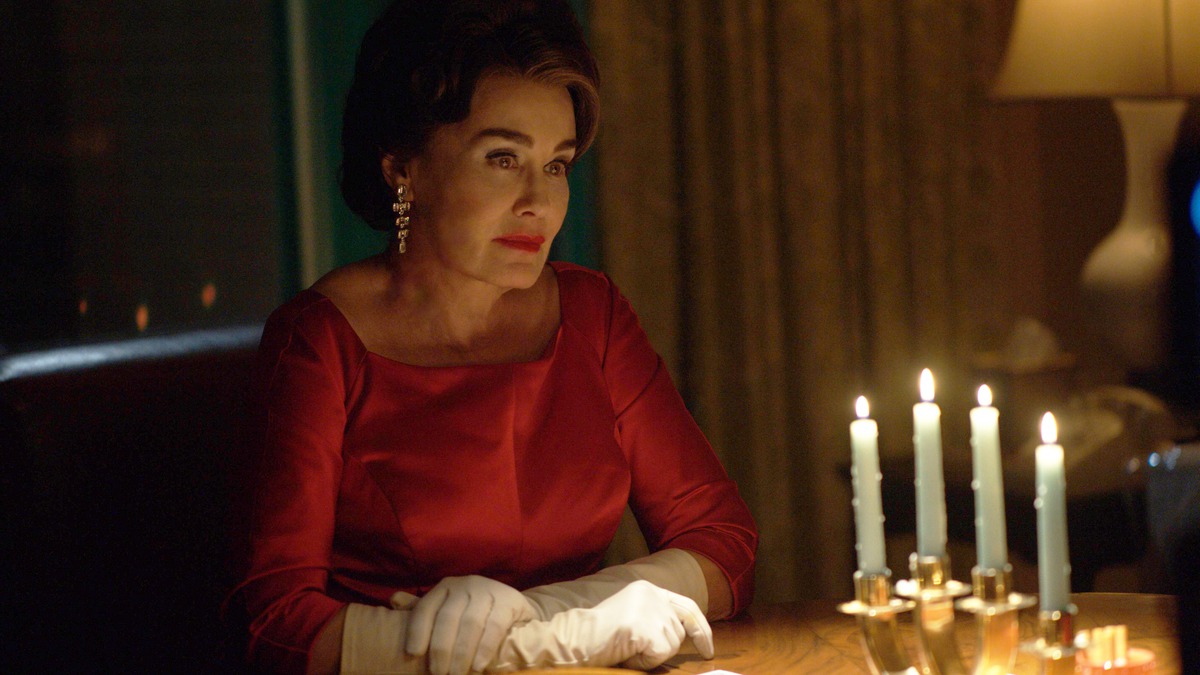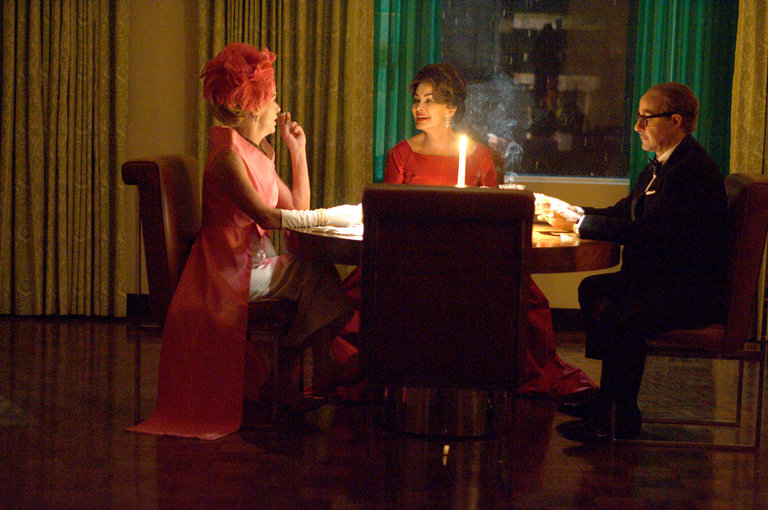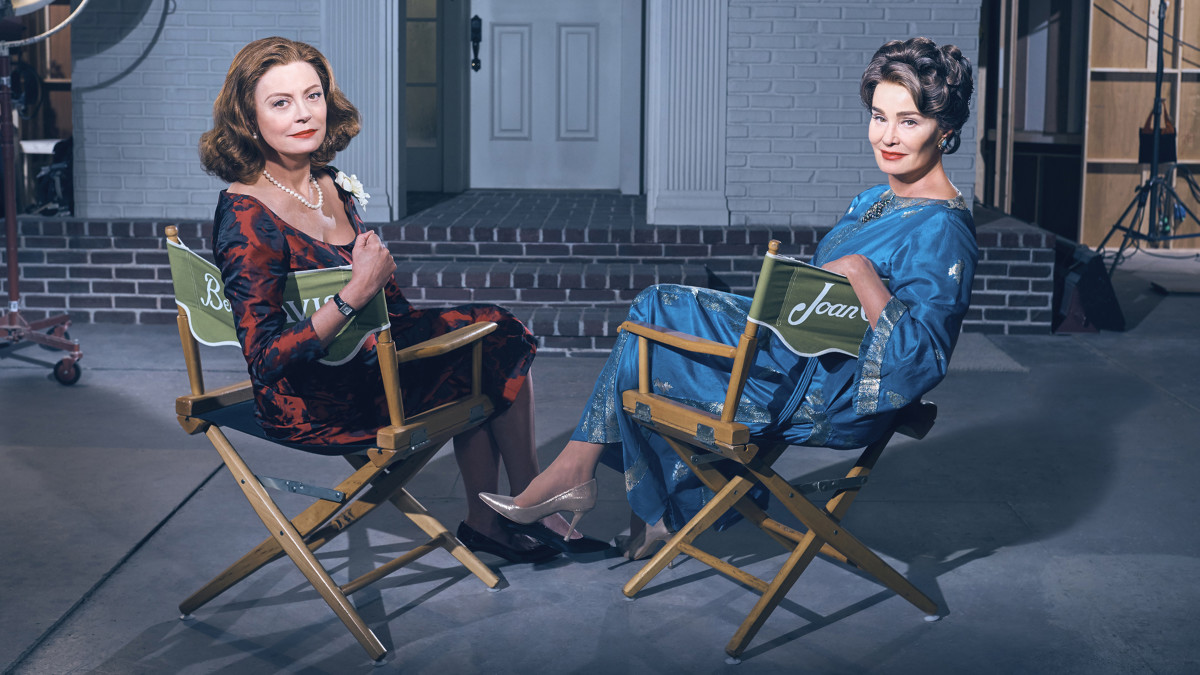In the season one finale, Joan goes to the dentist, Bette gets roasted, and the show answers the question “If you could have any four people over for dinner, dead or alive…?”

Last night, after seven weeks of behind-the-scenes introspections, gargantuan character work, and many, many hats, Feud reached its conclusion. And if it accomplished anything, it was making clear that, underneath the two legends the world knows as Joan Crawford and Bette Davis, there were two broken women with an eternal strive for outside validation, left empty once the cameras stopped rolling.
The finale presents the last years in the careers of Joan (Jessica Lange) and Bette (Susan Sarandon). But mostly Joan. Because she seemed to have been the most natural recipient of all the themes Ryan Murphy and company wanted to make evident: ageism, mysogny, merciless sacrifice for Hollywood, estrangement, ingratitude, and, mostly, pain...
The first half of the episode shows how Joan slowly became a recluse after being fired from Hush...Hush, Sweet Charlotte. She drifted away from a business that was only giving her laughable B-movie roles (we get a whole TROG! sequence) and that was literally making her insides rot (brush your teeth, kids!). Not even a lifestyle book deal could help her. After the unrelenting passage of time becomes too much to bear, Joan decides to stop taking roles altogether, and her entire world becomes her Manhattan apartment, her new dog, and Mamacita (Jackie Hoffman) three times a week.
Jessica Lange delivers her strongest performance in the series during this episode, acting mostly opposite herself and an empty room; projecting immense and soul-crushing loneliness, nostalgia, and longing for brighter times. Reese and Nicole better watch out -- Jessica is after that Emmy.
The finale also tries to deal with Bette's late-career moves, in which she took Joan's opposite strategy. She would take any and every role and opportunity she could, from failed pilots to being roasted. This contrast makes for an interesting statement on aging in Hollywood: no matter what you do, if you leave or you stay, the business will pay no attention to you anymore. We also see B.D.'s estrangement from Bette (in a last appearance from a fabulously styled Kiernan Shipka), and her difficulty finding other meaningful relationships. But Joan casts such a huge emotional shadow in comparison, that Bette's segment seems tame.

Feud has always played with history, but never more than in this episode. From the moment where Pauline (Alison Wright) mentions a fictionalized airport encounter with Joan (it has to be fictional since Pauline is one of the few made-up characters in the show), it's evident the show isn't scared to play around with facts to make a thematic point.
In what may be the scene with most historical and character liberties of the entire series, Joan imagines a dinner party between her, Bette Davis, Hedda Hopper (Judy Davis) and Jack Warner (Stanley Tucci). Together, they all air out their every grievance, intention, and regret. Even though the scene is an audience gift and a great display for every performer's talent, it was also the clearest example of how Feud nailed its themes on the head over and over by having the characters verbally speak them directly. As exquisitely staged as it was, it was not necessary. All that was discussed (how badly Joan was treated by the others, her mutual understandings with Bette, the joy of being in power) was either a reiteration of arlier episodes, or could have been easily shown through action. But we know that subtlety is not the show's forte.
However, that scene made me realize something else about the show.
At that point, Feud wasn't playing with reality anymore. It was conjuring up a completely made-up conversation, and having the characters confess feelings and thoughts we can never know for sure they actually had. It was using these vessels (Jessica Lange as Joan Crawford and Susan Sarandon as Bette Davis) and putting words in their mouths, not as fleshed-out characters, but as movie star icons, to make a point about Hollywood, and women, and fame, and power. Which is either a genius meta-commentary, or a complete destruction of everything the show tried to demystify. Maybe both. I can't make up my mind.

Joan dies a week after this encounter. She gets her two seconds on screen during the In Memoriam at the following year's Oscars, and a pitiful toast by Bette, Olivia DeHavilland (Catherine Zeta-Jones), Joan Blondell (Kathy Bates) and Victor Buono (Dominic Burgess), in another greatly assembled, but barely nuanced four-way scene.
The first season of Feud ends with a flasback to the first day of shooting Baby Jane; Bette and Joan laugh over an anecdote before heading to the first read-through.
"If there's anything I hope to get out of this, is a new friend" Joan says to Bette, to reinforce yet again how similar they really are. Although Joan probably never said that in real life.
Feud may have started out as a fun show about the behind-the-scenes of a fascinating episode in Hollywood history, and its two iconic leads, with a few things to say about the business along the way. But, for better or for worse, the show did its best to use these two women and their enviroment and circumstances to tackle bigger issues. It didn't always do it smoothly, and it rarely reached a compromise between historical accuracy and narrative drive.
Feud was a story of ambition, and loneliness, and the way we treat women, and how we love to elevate icons only to see them fall, and misogyny, and beauty regimes, and floral hats. It was the story of two broken women who happened to be Joan Crawford and Bette Davis.